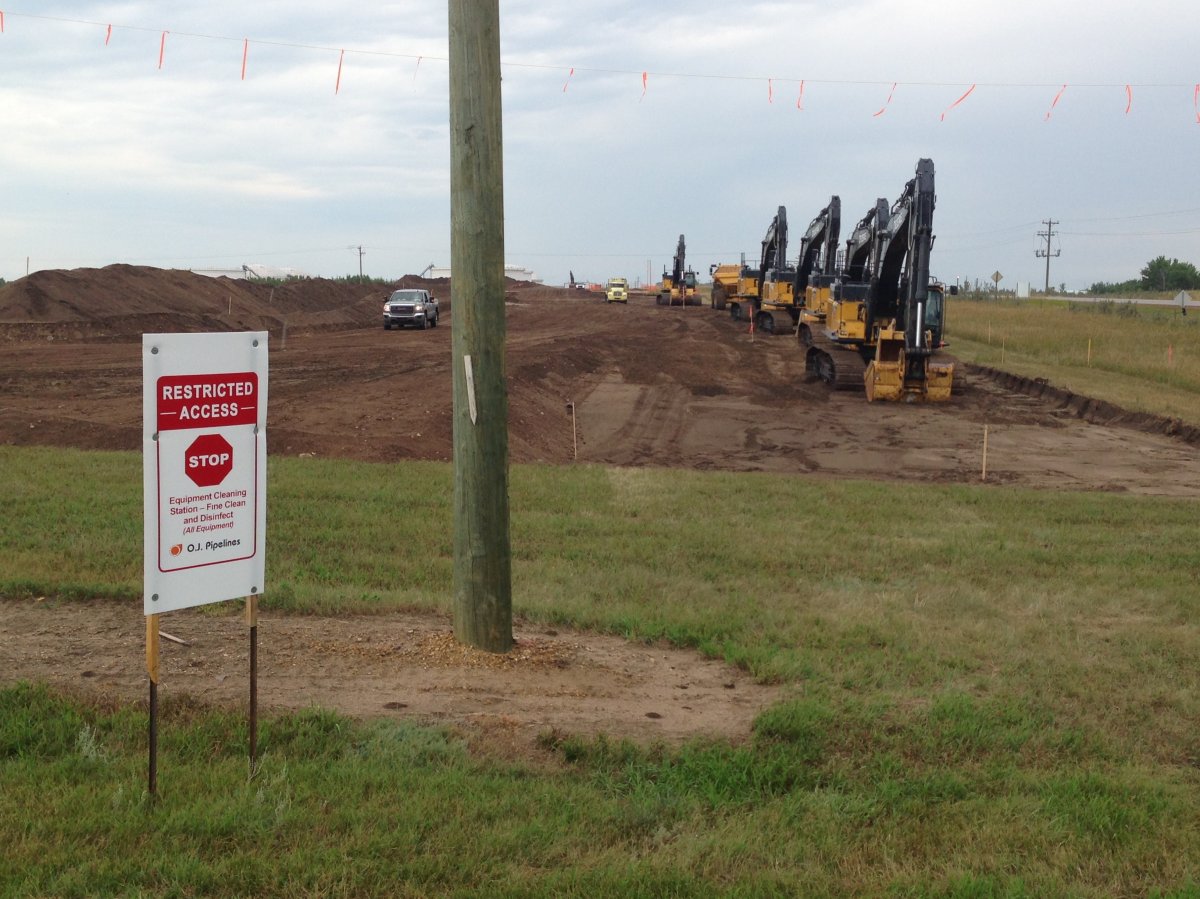Executives from the biggest oilsands companies in Canada say concerns about getting their products to market are easing in the wake of regulatory approval of Enbridge Inc.’s $9-billion Line 3 pipeline replacement project.

The project to add about 375,000 barrels per day of export capacity into the United States cleared its last major regulatory hurdle at the end of June when it was conditionally endorsed by Minnesota state officials.
READ MORE: Minnesota regulators approve Enbridge Line 3 project
Watch below: In August 2017, Kent Morrison filed this report about the Line 3 replacement project and the optimism it is generating in Alberta.

The decision, when combined with a deal by the federal government to buy the Trans Mountain pipeline and its expansion project for $4.5 billion, removes part of the uncertainty standing in the way of considering major expansion projects again, said executives from Suncor Energy Inc., Canadian Natural Resources Ltd., Imperial Oil Ltd., Husky Energy Inc. and Cenovus Energy Inc.
READ MORE: What you need to know about Enbridge’s Line 3 pipeline proposal
However, such decisions also hinge on improvements to federal and provincial regulatory predictability and taxation levels, they said while taking part in a panel at the TD Securities Calgary Energy Conference on Tuesday.
“Our view is expanded market access is necessary but not sufficient to ensure the competitiveness of our industry,” said Imperial CEO Rich Kruger.
“The real concern we have to work on… is the regulatory and the fiscal environment has to improve. We have to be more competitive,” agreed Canadian Natural executive chairman Steve Laut.
Recent increases in the U.S. benchmark price for crude oil to about US$75 per barrel from around US$55 last year are swelling North American oil company coffers but few are investing in increasing production, which means prices could soon rise to US$100 or more per barrel, said Peter Tertzakian, executive director of the ARC Energy Research Institute in Calgary.
“The probability of another price hike is quite high and I think the market is itching to take the prices to US$100. I think it could go well over US$100,” he said at the conference.
Watch below: On July 3, 2018, Tom Vernon filed this report about predictions we could see oil prices surge to $100 per barrel in the coming months.

If prices continue at current levels this year, almost $30 billion more revenue will go to Canadian energy companies than in 2017, he said, but most companies are looking at giving it to the shareholders through share buybacks or dividend increases, with only a few thinking about more drilling or buying competitors.
He said spending in Canada fell off over the past few years because companies were unable to sell their shares to investors due to low energy prices, and a successful but inaccurate campaign by environmentalists to suggest the world won’t need oil after the middle of the next decade.
READ MORE: Nexen announces $400M expansion of Alberta oilsands project
Investors around the globe have also been reluctant to invest in oil and gas, leading to falling supply and higher prices, said Suhail Al Mazrouei, the president of OPEC and energy minister for the United Arab Emirates, in a speech at the conference.
That’s why the Organization of Petroleum Exporting Countries and partners including Russia recently agreed to boost production by one million barrels per day, he explained.
“We wouldn’t do it if we were just happy with the higher prices,” he said.
“We would wait until the end of the year when the prices will be more than US$100, but that is not the target, the target is to have a balanced market supply and demand and hope that investors … make a return on their investment.”
Husky CEO Rob Peabody said his company expects to grow its overall oil and gas production by about five per cent per year going forward, adding it has excess pipeline capacity now but it will need more room for its growing western Canadian heavy oil production by about 2023.
READ MORE: Alberta likely to take equity stake in Trans Mountain pipeline: Notley
Watch below: Some videos from Global News stories about the Trans Mountain pipeline.
Suncor has sufficient contracted pipeline space as production ramps up at its recently completed 194,000-barrel-per-day Fort Hills oilsands project, but it will hold off on adding other major projects until it’s satisfied that all market access, regulatory and fiscal issues are more clearly understood, said chief operating officer Mark Little.
- Gas prices surge in some parts of Canada. What’s causing pain at the pumps?
- Roll Up To Win? Tim Hortons says $55K boat win email was ‘human error’
- Ontario premier calls cost of gas ‘absolutely disgusting,’ raises price-gouging concerns
- Netflix beats subscriber targets, but revenue falls short of forecast



















Comments